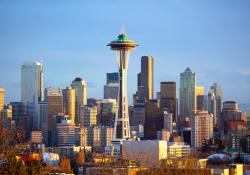
Jason Barnes, Editor of ITS International
By comparison with the snow paralysis which hit North America at the beginning of February, and the conditions endured by much of Northern Europe this last winter, it took only the lightest dusting of snow to bring the UK transport system slipping, sliding and then juddering to a halt in January. That perhaps understates the difficulties and dangers faced by some but the situation led to national debate over adequate allocation of resources and the ability to cope. I'll stay with the UK, because the points I want to make are universal. Several commentators in the national media observed (quite rightly, I think) that undue emphasis was being placed on an (in)ability to cope over a very small period; that providing adequate resources to deal with conditions over just a couple of the 52weeks on the calendar would very quickly swallow up funding that just doesn't exist. The cold snap served to demonstrate just how infrequently we in the UK have to cope with 'real' weather. It also demonstrated a very narrow definition of coping.
Many developed countries have existed in the post-industrial phase for quite some time. Fewer and fewer people work in factories actually making things. Where such places still exist, much is done by machines controlled by a fraction of the staff we once saw. Old-style manufacturing has long since departed for low-wage economies but many of those economies exist on a knife-edge; it will take only a slight rise in incomes to remove their advantage over automation. Then they too will face what other countries have already . But put such crystal ball-gazing aside. For two weeks, the UK stood still. And for two weeks my personal productivity was unaffected. It probably rose, in fact. I worked from home, gloried in not having to get up quite so early, took photographs of the garden covered in snow and, on rare forays to the local supermarket, watched the world become a friendlier place. Robbed of the ability to hurry, people stop to converse or help those who needed it. Writing this now, I rather miss it. And yet still we railed against the inability to 'cope'. We still cling to this need to travel to and from places of work. The blunt truth is that many of us don't need to be in the same room as others to do what we do. We already have the technologies in place that we need to remove many unnecessary car journeys and, potentially, the need for additional road capacity in some situations. We use technology to pump high-bandwidth entertainment into our homes yet fail to see how we can use this to improve quality of life in the broader sense. Perhaps we can be forgiven; as individuals, many of us are subject to the vagaries of employers who've yet to see the possibilities - or be encouraged to. Technology has reached a point where transport cannot be viewed in exclusivity. It can bring many back into employment who are currently excluded - new mothers, for instance, or the otherwise housebound or tied. The transport networks could be freed up for those who really need them. Transport has to be viewed, now more than ever, more intimately with policies on employment, on taxation, on where and how we live. Because quality of life means far more than a smooth commute, and quite often the greenest way to travel is via email.
That's the crux of it. The debate over whether manufacturing my new telephone or running shoes in China or India is sustainable or even wise in the geopolitical sense doesn't belong here. Transport, like politics, is local. 'Local' in the sense that it pertains to a limited geographic area, and 'local' in the sense of being immediate to the individual making a journey. We have to stop applying technology as a palliative if sustainability is the real goal. I'm all for the wider application of such things as road pricing, if only to counter the unthinking journey decisions which many of us still make. But until we accept the real truth, that many of the journeys people make are truly unnecessary, and that we need to both show people why and offer credible alternatives, we will continue to struggle to gain acceptance of real change.
Many developed countries have existed in the post-industrial phase for quite some time. Fewer and fewer people work in factories actually making things. Where such places still exist, much is done by machines controlled by a fraction of the staff we once saw. Old-style manufacturing has long since departed for low-wage economies but many of those economies exist on a knife-edge; it will take only a slight rise in incomes to remove their advantage over automation. Then they too will face what other countries have already . But put such crystal ball-gazing aside. For two weeks, the UK stood still. And for two weeks my personal productivity was unaffected. It probably rose, in fact. I worked from home, gloried in not having to get up quite so early, took photographs of the garden covered in snow and, on rare forays to the local supermarket, watched the world become a friendlier place. Robbed of the ability to hurry, people stop to converse or help those who needed it. Writing this now, I rather miss it. And yet still we railed against the inability to 'cope'. We still cling to this need to travel to and from places of work. The blunt truth is that many of us don't need to be in the same room as others to do what we do. We already have the technologies in place that we need to remove many unnecessary car journeys and, potentially, the need for additional road capacity in some situations. We use technology to pump high-bandwidth entertainment into our homes yet fail to see how we can use this to improve quality of life in the broader sense. Perhaps we can be forgiven; as individuals, many of us are subject to the vagaries of employers who've yet to see the possibilities - or be encouraged to. Technology has reached a point where transport cannot be viewed in exclusivity. It can bring many back into employment who are currently excluded - new mothers, for instance, or the otherwise housebound or tied. The transport networks could be freed up for those who really need them. Transport has to be viewed, now more than ever, more intimately with policies on employment, on taxation, on where and how we live. Because quality of life means far more than a smooth commute, and quite often the greenest way to travel is via email.
That's the crux of it. The debate over whether manufacturing my new telephone or running shoes in China or India is sustainable or even wise in the geopolitical sense doesn't belong here. Transport, like politics, is local. 'Local' in the sense that it pertains to a limited geographic area, and 'local' in the sense of being immediate to the individual making a journey. We have to stop applying technology as a palliative if sustainability is the real goal. I'm all for the wider application of such things as road pricing, if only to counter the unthinking journey decisions which many of us still make. But until we accept the real truth, that many of the journeys people make are truly unnecessary, and that we need to both show people why and offer credible alternatives, we will continue to struggle to gain acceptance of real change.











